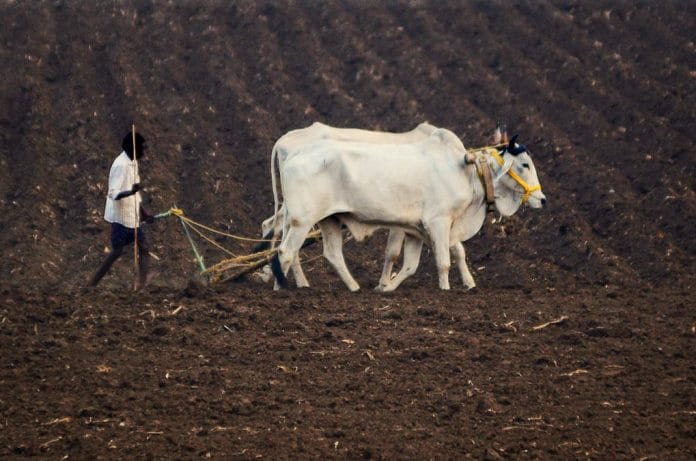New Delhi: The Narendra Modi government has been promoting Zero Budget Natural Farming (ZBNF) as a means to double farmers’ income for months. But public backing notwithstanding, the budget allocation for the promotion of the farming method remains meagre.
Since her July budget, when she stressed the use of the farming method that shuns use of chemicals and involves zero credit, Finance Minister Nirmala Sitharaman has often mentioned how ZBNF will double farmers’ income by going “back to basics”. Prime Minister Narendra Modi spoke about it too while addressing the 14th Conference of Parties of the UN Convention to Combat Desertification.
However, the budgetary allocation for the promotion of the farming method stands at just Rs 325 crore, officials in the Union Ministry of Agriculture told ThePrint.
Looking after ZBNF promotion in the country, the Paramparagat Krishi Vikas Yojana, a sub-component of Soil Health Management scheme under the National Mission of Sustainable Agriculture (NMSA), has an outlay of only Rs 325 crore, said a senior ministry official, which who did not wish to be named.
Out of this, Rs 120 crore has been allocated to the Department of Agricultural Research and Education to conduct experiments at multiple locations and gather findings to establish the viability of ZBNF, said the official.
Under its Network Project on Organic Farming and All India Coordinated Research Projects, the Indian Council of Agricultural Research is supervising these experiments at Modipuram (Uttar Pradesh), Ludhiana (Punjab), Pantnagar (Uttarakhand) and Kurukshetra (Haryana).
However, it will take at least two to three years to get results and assess ZBNF’s viability for small and medium farmers, said the official, adding the remaining budget allocation is to be utilised to adopt villages practising organic farming and promotion of the practice.
In comparison, the official said, subsidies on chemical fertiliser were increased by almost Rs 10,000 crore to Rs 79,996 crore in the 2019-20 budget. “Out of this, Rs 53,629 crore is towards urea subsidy and Rs 26,367 crore towards nutrient-based subsidies.”
But some states and the Modi government are still looking at the method, despite facing flak from senior officials of the agriculture ministry and the NITI Aayog for lack of ZBNF promotion on a large scale.
Also read: Modi govt backs cow dung-based farming. Now its own officials call it a ‘myth’
State support
Agriculture ministry officials said states like Chhattisgarh, Uttarakhand, Maharashtra and Kerala have shown interest in Zero Budget Natural Farming, but only Andhra Pradesh, Karnataka and Himachal Pradesh have allocated capital for it from state budget.
“Andhra Pradesh is the leading state in the adoption of ZBNF. Karnataka has allocated Rs 50 crore for the adoption of ZBNF while Himachal Pradesh has kept aside only Rs 25 crore for it,” said a second agriculture ministry official.
However, Andhra Pradesh has already spent about Rs 300 crore this fiscal to promote ZBNF among farmers as the government looks to bring 9 million hectares, the entire cultivable land in the state, under ZBNF by 2024.
“The estimated cost of this is around Rs 15,000-17,000 crore,” said the second official.
The Andhra model
To promote and implement Zero Budget Natural Farming, the Andhra Pradesh government has established Rythu Sadhikara Samstha (RYSS), a not-for-profit organisation aiming to reach at least 691 gram panchayats in the state by 2022 by covering 35 lakh farmers.
“In the last three years, we have covered 6.25 lakh farmers, of which around 4 lakh practise chemical-free agriculture and the rest are the ones who purely adhere to ZBNF. Five lakh acres of land in the state come under ZBNF now,” said Murali Dhar, a senior consultant and farm mentor at RYSS.
“We are also in the final stage of getting a low-cost interest loan from KfW (a German bank) for promoting ZBNF in Andhra Pradesh,” added Dhar.
“So far, Azim Premji Philanthropic Initiative has given Rs 100 crore for ZBNF support in Andhra, with Food and Agriculture Organisation (FAO) also giving Rs 1 crore,” added the ministry official quoted above.
Also read: India’s bumper cane crop will cause a global sugar glut again in 2020







It’s a good thing that there is limited budget. Caution is important. An investment in region specific R&D should take priority.
Why in the world, in 2020, the poor farmer is doing farming this way?? Bullet train is more important than modernizing Agriculture in India??? Sheesh.